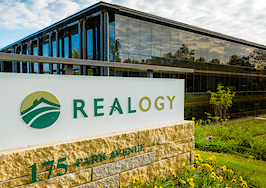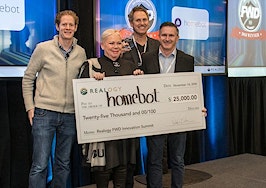Realogy CEO Ryan Schneider is laser-focused on the industry perception that Realogy is slow. It’s evident from speaking with him that he’s spent much of his first year shirking the notion that the industry’s largest real estate holding company and largest residential real estate brokerage moves at a glacial pace.

Ryan Schneider, CEO of Realogy. (Credit: Realogy)
Schneider took the helm of Realogy in December of last year and, at the time, didn’t seem like a traditional hire – he had never worked in real estate before taking the job. Prior to joining Realogy, he was the president of Capital One’s credit card division and worked most of his career in consumer finance and credit.
Realogy’s portfolio of brands includes Better Homes and Gardens Real Estate, Century 21, Climb Real Estate, Coldwell Banker, Corcoran, ERA Real Estate and Sotheby’s International Realty.
Schneider will be speaking at Inman Connect in New York, in a talk titled, “What I Learned About Real Estate in The Last Year,” covering topics related to the turning market and how companies are being forced to adapt to new ways of business.
He spoke with Inman this week, in a wide-ranging conversation in which he reflected on his first year, why he believes agents are the future and that notion that Realogy moves slowly.
You came into this industry without a real estate background. What has the learning curve been like for you in your first year?
The learning curve has been steep but it’s also been incredibly important and exciting. The most important thing I learned this year was really understanding what agents and franchisees need to be successful. I came into this world with this incredibly strong belief that agents are the future of real estate and I believe that even more today. Especially if we arm them with better technology and data to make them even more successful. I know many people don’t believe in agents for the future, but I do. And so for me, really understanding what agents need to grow their business was the most important part of that learning curve and I’ve really enjoyed the experience of going up the curve.
What’s something that you were surprised to learn about the industry?
First is the intensity of competition in this industry is even stronger than I thought coming in. I knew coming into the industry it was a very intense business and that there were low barriers to entry, but living it every single day and watching what our agents and franchisees do every single day to compete for business really made a big impression on me in just how in intense that is.
Related to that was I came into this industry believing there was a substantial opportunity to do more to help agents with technology and data and I’ve actually been surprised at how big that opportunity still is in this industry. And it makes me really excited because we’re obviously focused on doing that. But the fact that opportunity hasn’t already been seized and solved by the whole industry was a bit of a surprise to me. It creates a real opportunity for us to help our agents do more and grow their business.
How do you balance competition within your own company, within the own-side and franchises and within franchises in the same market?
I spend very little time worrying about the competition within the Realogy family. We are very blessed to have the market leading position and be the number one owned-brokerage as well as being the number one franchise brokerage company in our industry. But there’s still over 80 percent of the market that we don’t have as Realogy. I spend all of my time focused on what we should be doing to compete with the other intense competitors out there and I actually haven’t had to spend almost any time focused on competition within the company. There’s so much opportunity for us to help our agents grow and our business grow beyond what Realogy has today.

Realogy’s Madison, New Jersey headquarters. (Credit: Nick Renda)
As you look back on this first year, what are some decisions you made that you’re most proud of as CEO?
I’m most proud of two things in year one. First, Realogy is starting to move fast. We’re a big animal in real estate, but the perception is that Realogy has been slow and we’re slow to change. And there’s some truth in that perception. But in 2018 we began accelerating: new technology, new recruiting, new brands, new talent and a big animal moving fast can be really powerful.
The second thing I’m proud of is that we stayed laser-focused on agents in 2018. While many in this industry don’t see agents as the future, I think they’re wrong. I believe agents, especially with our technology and data, are the future and that’s what we stayed focused on.
What is something you wish you had done differently?
I really wished we had moved even faster on everything. For everything that we’re doing to accelerate Realogy’s pace to help our agents – whether it’s branding, whether it’s technology, recruiting, etc – I really wish I had been able to move faster on effectively every single one of those. But I’m incredibly committed to making that move faster into 2019.
We saw a big trend in 2018 that all of these brokerages and franchises are competing to build an end-to-end real estate platform. Is that something that’s going to be a focus for Realogy in 2019 or do you think that your agents and franchises are best served by a combination of in-house tech and stuff available from outside vendors?
I am a passionate believer that the right technology in the real estate industry is to have the flexibility to let agents use what’s best for their business. And I believe some of that can and should be provided by a big technology scale player like Realogy. But we also have to be able to let agents use third-party products they want in an easy to integrate way with the technology we provide.
I don’t believe we will try to develop or build a single end-to-end platform for real estate. We want to meet our agents where they want to use technology. That’s going to vary by agent. We have to provide great technology as Realogy. We have to partner with people like we did this year with Facebook and Ojo and Notarize to provide different technology to agents. And we also need to create that open architecture to let people select other things they want to use and have them work in our ecosystem. That’s my strong view on that.
One of the innovations that you launched this year was an iBuyer for the own-side Coldwell Banker franchises. Can you report on the early returns on that program and is it something you’re going to expand on?
We’re really excited about our cataLIST project partnership with Home Partners of America. We think it’s already starting to show successful results for consumers. We have a lot of consumer interest in our target markets of Dallas, Atlanta and Tampa. We’ve already closed on and purchased some houses with Home Partners of America. We’d love to make this a bigger part of our offering both for our own agents and hopefully over time for franchisees. We are still in early days but we’re very excited about the momentum we’ve got here.
Is Realogy’s size ever a hindrance to rolling out new products or testing new things?
Realogy’s size and scale is primarily a massive strength. We have the scale to be the industry-leading player. We are basically the only national brokerage across everything. That scale also helps us not just with the technology scale but the data scale. We have access to more data, we believe, than anyone else in this industry. That combination of scale is really powerful.
But your question does hit on something that is true. Because of the size and because we have a strategy with multiple brands in both own and franchise, we have more fragmentation within our company than companies that only have a single brand or a single approach to everything. That can mean it’s harder for us to roll something out across the whole company. It’s not as fast as it would be otherwise. But that’s the kind of thing, when I talk about moving fast, that we’re focused on changing. We’re want to make it so we can get good products to all of our brands as quickly as possible, not just one at a time. As part of our commitment to moving fast, we’re breaking down some of those historical barriers in our own company, because we know we’re judged by the speed we move with our agents and they are the ultimate judges of how successful we are. So we do have some challenges there and we’re focused very much on confronting them to move fast.
What do you think is the biggest misconception about Realogy?
I think there are two things people think about Realogy that I do not believe are true today and are not going to be true in the future. One is, as I mentioned earlier, the perception that Realogy is slow. And that may have some truth in it historically, I believe we’re starting to demonstrate in multiple areas that we are beginning to accelerate and move much faster as a company. As you heard earlier, that’s an incredibly important focus for me and the whole company, to move faster to support our agents and franchisees in 2019.
The other misperception is, people do think — because people think Realogy is so focused on agents — that Realogy’s future is not as bright because the agent future is not bright. I think people who think the agent future isn’t bright are actually wrong. I think agents are and have been and continue to be at the core of the real estate system. Agents deliver great value, especially for what’s typically the biggest financial transaction in someone’s life. I think agents are going to be at the core of this business in the future, especially if armed with great technology and data. The idea that agents are not going to be as important as they’ve been in the past, I think is wrong. And because we are so focused on agents, I think people often will have a negative impression on us. I believe the premise is wrong and I’m incredibly proud of the couple hundred thousand agents that we work really hard to try and make successful every day.

Realogy CEO Ryan Schneider. (Credit: Realogy)
What are some industry trends that you really like that have come out in the last year?
Let me start with a trend that’s not just in the last year – let’s start with, this industry itself has great trends, at the core of it we’re helping people buy and sell homes and making families dreams come true and everybody is really excited about this industry. There’s a ton of competition in it, a lot of people want to invest in it. It’s an attractive business, it’s got great demographics, supporting future growth of it. We’re in a great industry.
The thing that’s probably most exciting to me is this is just an incredible time right now around innovation and technology and data, both as a society but also in real estate. I love the opportunity to use Realogoy’s strengths, the dollars we have to spend on technology, or unparalleled data access, the great brands that we have, the great agents we have, to see how much innovation we can drive at this moment, this incredibly interesting time in the world.
The flipside is, what are some industry trends you’re not a fan of and wish would go away?
Well, it repeats a point I made earlier. There is this fashionable trend of people discounting agents and the value they provide to consumers out in the world. I really believe agents deliver great value to consumers in helping them make the most important financial transaction in their lives. Agents role in the future is much brighter than a lot of people believe. But it’s fashionable to look at the new shiny objects and maybe undervalue the current way things are done. That fashionable trend of discounting agents is something I’m a little surprised by, and given our views on agents, obviously not a big fan of.
Can you give specifics? When we’re talking about companies that discount agents are we talking about low-fee brokerages or companies that are more tech-focused?
I think there’s a series of companies out there who believe real estate transactions either can and should be done without agents and any humans involved, or believe agents don’t have a lot of value so there’s no reason to pay very much for the service of helping buy or sell a house. You’ve seen multiple companies either start with those premises or try to compete with those premises. I just don’t agree with that. But we compete with them every day and we’re excited to compete with them. I’m going to bet on the agents, in particular, if they can be increasingly armed with innovative tech and data, being the ones to win in this industry over time.
When you say industry tech and data, what specific tech and data innovations are you most excited about that Realogy is working on or other vendors are working on?
I think there’s a lot of people in the industry working on technology and data innovation in real estate and I think we’re all trying to still produce great things. There’s a lot of opportunity for everyone in that area. I’m most excited about things we are starting to do to help drive agent productivity, through lead generation, advanced analytics to help agents use their time more productively and different pieces of technology we’re giving agents to let them spend less of their time on the process parts of real estate and more of their time on generating listings and actually helping consumers do the buying and selling, really leveraging the agents value around transaction execution, knowing their local market, setting a great price, doing marketing, etc. Many of those things require us to provide increasingly better technology for agents, whether we produce it ourselves or we leverage some of the third-party things.
Where is the industry falling short with consumers?
I think today, if I think about where we’re falling short, it’s around simplicity and creating increasingly simple transactions. If you think about all the pieces that happen – you’ve got mortgage, you’ve got title, you’ve got all the paperwork, different processes that the consumer has to go through – even with all of the digital tools that all of us are working with to help our agents and help the customers use, it’s still a pretty complex process.
As a company, we have mortgage, we have title, we have a number of the things that go into it. And nobody, including us, has really found a way to truly simplify the process. But boy we have the potential to do that and the size and scale and the pieces. But it’s still a complex process. With all of the pieces, companies that have the size and scale of Realogy have the chance to build a consumer experience for the home sale and closing process. But that hasn’t been done by anyone including us in the market to date.

Realogy leaders hand out a $25,000 check at their annual innovation summit. (Credit: Realogy)
Is there any segment of the market that you don’t think Realogy covers yet and you’d like to cover better?
Today, Realogy covers pretty much the full spectrum of the market, from starter homes to some of the biggest luxury homes in the world. If you think about some gaps, two gaps that we do think exist, Corcoran and Climb help fill.
Corcoran is an incredibly strong brand at the higher end of real estate, not just in some U.S. cities but really internationally. Our business is really skewed domestic, so it opens up an international part of our business that we don’t have as much of when you compare to our domestic.
Climb gets at a younger agent and customer demographic, a more urban real estate market that we don’t typically have as much strength in today in some cities and it’s also a mobile-only approach that helps us provide some coverage that we may not have as much of today. In all cases, both our existing brands and our new brands have 80 percent of the market to go after today and that’s why I actually like having more options that cover more pieces of the market with different brand positions and different value propositions to maximize our chances of not just maintaining what we have but getting out our front foot from a growth standpoint and growing and taking share out there on the market.
Things are starting to change in the market. Do you think that will fundamentally change the real estate industry at all and how are you equipping Realogy’s agents and associates to deal with a market slowdown?
The market has substantially slowed down in the last three months and market slowdowns are not new. If anyone is well-positioned to weather a market slowdown it’s going to be us between our scale, our financial strength, our strong network of agents and brands. And a lot of people we compete with have only operated in the good times of the last decade. We have experience going through both good and challenging times and it will serve us well no matter what the future holds. We are in a cyclical business and with cycles it’s a question of when, not if, but I feel very well-positioned to keep making investments to help our agents even during the down part of a cycle. Making investments to grow, more opportunities to make franchisees successful in the down part of a cycle. We’re committed to doing that no matter what comes in 2019 and beyond.
Who do you see as Realogy’s biggest competition?
The first answer is, our biggest competition is whoever every one of our agents is competing with for a listing. We only succeed when our agents succeed, so whoever they are competing for a listing with, that is our competition and we have to do everything we can to make sure our agent is the successful one who wins that listing.
The second answer is, in many ways, our biggest competition is ourselves, which is, we have so much scale, assets, strength to leverage that if we can move fast, we can be that powerful animal I referred to earlier. I believe we will do great things for our agents and our franchisees when we do that. And so making sure that we as a company move fast and don’t get in our own way so that we can make our agents and our franchisees successful, I think is our biggest competition. I worry about that even more than I worry about any one of the good competitors we compete with every single day.






